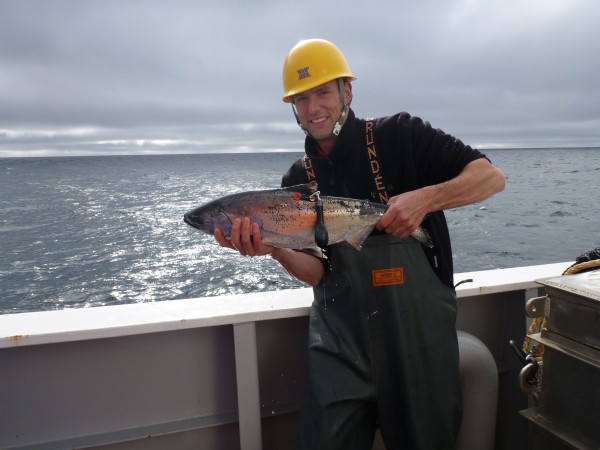Sharks prey on large king salmon in the Bering Sea
May 6, 2015
907-474-7208
5/5/2015
Research has revealed another potential reason for low king salmon returns in Alaska — sharks.
University of Alaska Fairbanks researcher Andrew Seitz made the discovery when he noticed some unusual temperature readings from pop-up satellite tags on large king salmon in the Bering Sea.

“The temperature recorded by the tags jumped from the typical 40- to 55-degree water inhabited by king salmon in the Bering Sea to 65 to 80 degrees in a matter of seconds,” said Seitz. “The only habitat with temperatures in that range in the Bering Sea is in the belly of a warm-blooded predator. Marine mammals, such as seals, sea lions and whales, have body temperatures approximately the same as humans, about 97-100 degrees, leaving only one other culprit.”
Salmon sharks, which are closely related to mako and great white sharks, are able to keep their body temperature warmer than the surrounding water. Previous studies have found that the guts of salmon sharks are typically 65-80 degrees.
The data suggests that two of his tags spent about three days inside the bellies of salmon sharks, apparently consumed along with the fish they were attached to, before being regurgitated back into the Bering Sea and floating to the surface to transmit data.
“It’s too early to tell if salmon sharks are having an effect on the overall abundance of king salmon in the Bering Sea, but the older, larger life stage has been largely left out of discussions about marine mortality of king salmon,” said Seitz.
Seitz said recently published research conducted on the East Coast suggests that a close relative of salmon sharks in the North Atlantic Ocean, the porbeagle, is partially hindering the recovery of imperiled Atlantic salmon.
Seitz is an assistant professor of fisheries at the UAF School of Fisheries and Ocean Sciences and has been working on this project with researchers from the National Marine Fisheries Service in Juneau and the University of Washington’s High Seas Salmon Research program. He plans to further investigate predation on large king salmon by salmon sharks this summer by participating in a Japanese research cruise and deploying more pop-up satellite tags on king salmon in the Bering Sea.
“These tags are the only feasible way to collect this data,” said Seitz, “This new information will hopefully provide another piece of the puzzle of potential factors causing low abundance of king salmon in Alaska.”
ADDITIONAL CONTACTS: Andrew Seitz, acseitz@alaska.edu, 907-474-5254.
SW/5-6-15/278-15


